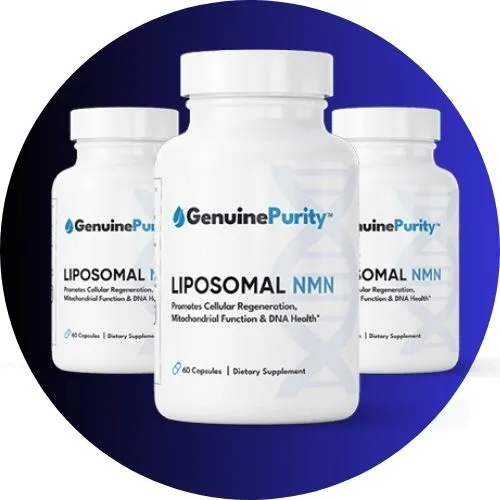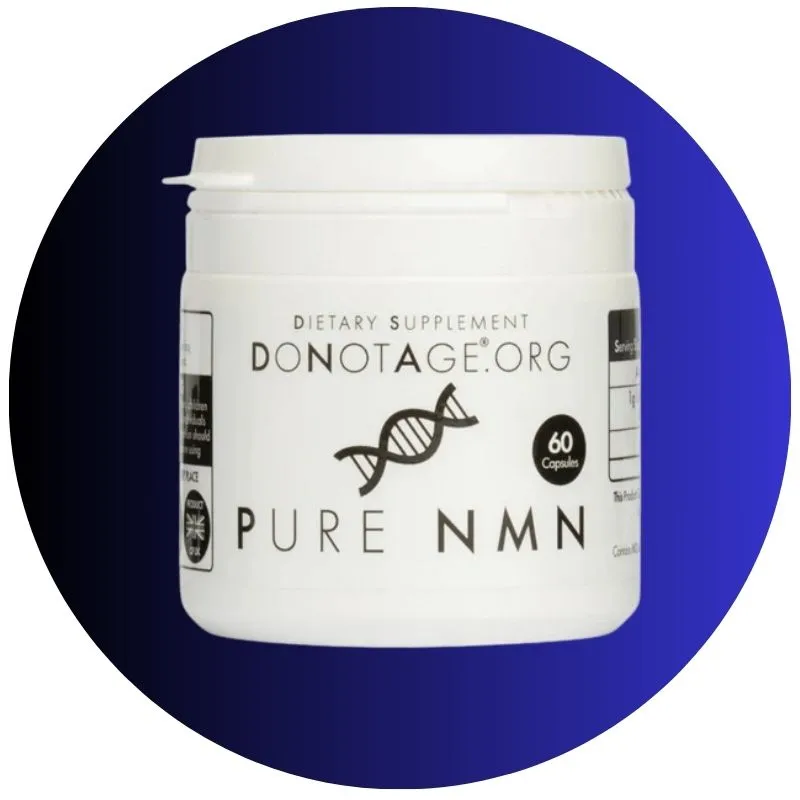Our optimal health and well-being is significantly dependent on the intricate relationship between metabolism and weight management. Nicotinamide mononucleotide (NMN) may be key to unlocking the secrets of metabolic regulation and its impact on weight management. As a precursor to Nicotinamide Adenine Dinucleotide (NAD+), NMN is thought to play a crucial part in cellular energy production and overall metabolic function.
Metabolism is the set of life-sustaining chemical reactions in organisms, encompassing both anabolism (the building up of compounds) and catabolism (the breaking down of compounds to release energy). A well-functioning metabolism is critical for maintaining a healthy weight, as it determines how efficiently our bodies convert food into energy and how we store fat.
This article delves into the fascinating world of NMN, exploring its potential effects on nicotinamide adenine dinucleotide (NAD+) levels, cellular metabolism, and its role in supporting healthy weight management.
Metabolism and Weight Management
Metabolism is a complex network of chemical reactions within our cells, responsible for converting food into energy and facilitating various bodily functions. At its core, metabolism consists of three main components: basal metabolic rate (BMR), the thermic effect of food (TEF), and physical activity level.
Metabolism consists of several key components:
- Basal Metabolic Rate (BMR): This is the amount of energy expended while at rest in a neutrally temperate environment, in the post-absorptive state (meaning that the digestive system is inactive). BMR accounts for the largest portion of the total daily energy expenditure, reflecting the energy required to maintain basic physiological functions like breathing, circulation, and cell production.
- Thermic Effect of Food (TEF): This refers to the energy required for digestion, absorption, and disposal of ingested nutrients. It is estimated that about 10% of the total caloric intake is used for this purpose.
- Physical Activity Level: This includes all the energy expended through physical movement, from basic activities like walking and standing to more intense exercises like running or weightlifting.
Regarding weight management, metabolism is crucial in determining the balance between caloric intake and expenditure. A slower metabolism can lead to a higher propensity for fat storage, making weight loss more challenging. On the other hand, a faster metabolism can facilitate more efficient calorie burning, supporting weight management efforts.
- Understanding NAD+ and Metabolism
NAD+ (nicotinamide adenine dinucleotide) is an essential coenzyme in every body cell. It is a crucial cofactor in numerous metabolic processes, including energy production, DNA repair, and cellular signaling. NAD+ plays a pivotal role in regulating metabolism by participating in redox reactions that drive various enzymatic processes.
The importance of NAD+ in metabolism cannot be overstated. It is involved in glycolysis, breaking down glucose to generate energy as ATP (adenosine triphosphate). Additionally, NAD+ is essential for properly functioning the citric acid cycle and oxidative phosphorylation, which are critical steps in generating ATP from nutrients.
Research has suggested a potential link between declining NAD+ levels and metabolic dysfunction, which can contribute to various age-related metabolic disorders, such as obesity, type 2 diabetes, and metabolic syndrome.
- The Relationship between NMN and NAD+ Levels
NMN (Nicotinamide Mononucleotide) is a naturally occurring nucleotide that is a direct precursor to NAD+. In other words, NMN is a key component in the biosynthesis of NAD+ within our cells.
As we age, our bodies’ ability to produce and maintain optimal levels of NAD+ can decline, leading to potential metabolic imbalances and associated health consequences. NMN supplementation has emerged as a promising strategy to replenish and boost NAD+ levels, potentially counteracting this age-related decline.
Research has shown that NMN supplementation can effectively increase NAD+ levels in various tissues, including the liver, muscle, and brain. However, it’s important to note that the bioavailability and efficacy of NMN can be influenced by factors such as dosage, delivery method, and individual metabolic differences.
- NMN’s Impact on Metabolic Health
By boosting NAD+ levels, NMN supplementation may have far-reaching effects on metabolic processes within our bodies. Several studies have explored the potential impact of NMN on various aspects of metabolic health, including glucose and lipid metabolism.
Glucose Metabolism: NAD+ plays a crucial role in regulating glucose metabolism through its involvement in glycolysis and other metabolic pathways. Research has suggested that NMN supplementation may help improve glucose homeostasis and insulin sensitivity, potentially benefiting individuals with metabolic disorders such as type 2 diabetes.
Lipid Metabolism: NAD+ is also involved in lipid metabolism, influencing fatty acid oxidation and lipogenesis (fat synthesis). Emerging evidence indicates that NMN supplementation may positively impact lipid metabolism, potentially contributing to improved cholesterol levels and reduced fat accumulation.
Metabolic Regulation: Beyond glucose and lipid metabolism, NMN has been explored for its potential role in regulating other metabolic processes. Studies have shown that NMN supplementation may activate sirtuins, a class of enzymes involved in various cellular processes, including metabolic regulation, stress response, and aging.
- NMN and Weight Management
Given the intricate relationship between metabolism and weight management, the potential impact of NMN supplementation on weight control has garnered significant interest. While research in this area is ongoing, several mechanisms have been proposed to explain how NMN may influence energy expenditure and body composition.
Energy Expenditure: By increasing NAD+ levels and supporting optimal metabolic function, NMN supplementation may enhance energy expenditure. This could be achieved through improved mitochondrial function, leading to more efficient energy utilization and potentially increased calorie burning.
Fat Metabolism: NMN’s potential effects on lipid metabolism, including fatty acid oxidation and lipogenesis, may play a role in weight management. NMN supplementation could contribute to a more favorable body composition by promoting fat oxidation and reducing fat accumulation.
Appetite Regulation: Some studies have suggested a potential link between NAD+ levels and appetite regulation, though the mechanisms are not fully understood. If NMN supplementation can influence appetite and food intake, it could indirectly impact weight management efforts.
While the research on NMN’s direct effects on weight management is still in its early stages, several studies have shown promising results. For instance, a study conducted on obese mice found that NMN supplementation led to significant weight loss and improved metabolic parameters, including reduced fat accumulation and improved glucose tolerance.
- Potential Benefits and Considerations
Based on the current understanding of NMN’s potential effects on metabolism and weight management, several potential benefits have been proposed:
– Support for Healthy Metabolism: By boosting NAD+ levels, NMN supplementation may help maintain optimal metabolic function, potentially benefiting individuals with metabolic disorders or those seeking to support overall metabolic health.
– Enhanced Energy Expenditure and Fat Metabolism: The potential impact of NMN on energy expenditure and fat metabolism could contribute to weight management efforts and support a healthy body composition.
– Improved Glucose and Lipid Regulation: NMN’s potential effects on glucose and lipid metabolism may benefit individuals with metabolic conditions such as type 2 diabetes or dyslipidemia.
However, it’s important to note that while NMN supplementation shows promise, more research is needed to fully understand its safety, optimal dosing, and long-term effects. Additionally, potential side effects, such as digestive discomfort or allergic reactions, cannot be ruled out.
It’s crucial to consult with a healthcare professional before incorporating NMN supplements into your routine, especially if you have any underlying medical conditions or are taking medications.
How Genuine Purity Liposomal NMN Helps Metabolism?

Genuine Purity Liposomal NMN is a high-quality supplement that offers several advantages for metabolism. Liposomal NMN involves encapsulating NMN molecules within liposomes, which are tiny spherical vesicles composed of phospholipids. This encapsulation method protects NMN from degradation in the digestive system, allowing for more efficient absorption into the bloodstream.
Genuine Purity Liposomal NMN can help metabolism in several ways:
- Enhanced Bioavailability:
Liposomal delivery systems are designed to improve the bioavailability and absorption of nutrients. As a water-soluble compound, NMN can face challenges with absorption in the gastrointestinal tract. Encapsulating NMN in liposomes (lipid-based carriers) can protect it from degradation and facilitate its efficient absorption into the bloodstream, potentially increasing its availability to cells and tissues throughout the body.
- Increased NAD+ Levels:
As the article mentions, NMN is a direct precursor to NAD+, a crucial coenzyme involved in various metabolic processes, including energy production, glucose and lipid metabolism, and cellular signaling. Enhancing the bioavailability of NMN through liposomal delivery may lead to higher intracellular NAD+ levels, supporting optimal metabolic function.
- Improved Mitochondrial Function:
NAD+ is vital in mitochondrial function and essential for cellular energy production. Mitochondria are often called the “powerhouses” of cells, as they are responsible for generating ATP (adenosine triphosphate) through cellular respiration. By increasing NAD+ levels, liposomal NMN may support mitochondrial health and efficiency, potentially enhancing energy metabolism and overall metabolic performance.
- Regulation of Metabolic Enzymes:
NAD+ is a cofactor for various enzymes involved in metabolic pathways, such as glycolysis, the citric acid cycle, and fatty acid oxidation. By maintaining optimal NAD+ levels through liposomal NMN supplementation, these metabolic enzymes may function more efficiently, contributing to better glucose and lipid metabolism regulation.
- Potential Effects on Metabolic Signaling Pathways:
NAD+ also regulates metabolic signaling pathways, such as those mediated by sirtuins (a class of enzymes involved in cellular processes like metabolic regulation and aging). Liposomal NMN may indirectly regulate metabolic processes by influencing these pathways, potentially supporting weight management, glucose homeostasis, and overall metabolic health.
Buy Genuine Purity Liposomal NMN Now

Genuine Purity Liposomal NMN is one of the most affordable and effective NMN supplements on the market, making it accessible to anyone seeking to optimize their metabolic function and support healthy aging. With a pack of 1 bottle (30 capsules) costing $89.95, you can start your journey towards metabolic excellence today. For even greater savings, consider ordering a pack of 3 bottles for $239.95 or a pack of 6 bottles for $379.95.
Invest in your metabolic health and longevity with Genuine Purity Liposomal NMN. Experience the power of this innovative supplement and unlock your body’s full metabolic potential, paving the way for a healthier, more vibrant life.
Conclusion
The relationship between NMN, NAD+ levels, and metabolism is a fascinating research area with significant potential for supporting metabolic health and weight management. It’s important to remember that NMN supplementation should not be viewed as a magic solution for weight loss or metabolic issues. Instead, it should be considered a potential complementary approach to a balanced diet and an active lifestyle.
References:
- Yoshino, J., Mills, K. F., Yoon, M. J., & Imai, S. (2011). Nicotinamide mononucleotide, a key NAD+ intermediate, treats the pathophysiology of diet- and age-induced diabetes in mice. Cell Metabolism, 14(4), 528-536.
- Sinclair, D. A., & Guarente, L. (2014). Small-molecule allosteric activators of sirtuins. Annual Review of Pharmacology and Toxicology, 54, 363-380.
- Imai, S., & Guarente, L. (2016). NAD+ and sirtuins in aging and disease. Trends in Cell Biology, 26(8), 464-471.
- Mills, K. F., Yoshida, S., Stein, L. R., Grozio, A., Kubota, S., Sasaki, Y., … & Imai, S. (2016). Long-term administration of nicotinamide mononucleotide mitigates age-associated physiological decline in mice. Cell Metabolism, 24(6), 795-806.
- Zhang, H., Ryu, D., Wu, Y., Gariani, K., Wang, X., Luan, P., … & Auwerx, J. (2016). NAD+ repletion improves mitochondrial and stem cell function and enhances life span in mice. Science, 352(6292), 1436-1443.


